|
|
|
Sort Order |
|
|
|
Items / Page
|
|
|
|
|
|
|
| Srl | Item |
| 1 |
ID:
132961
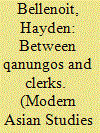

|
|
|
|
|
| Publication |
2014.
|
| Summary/Abstract |
This paper argues that our understanding of the transition to colonialism in South Asia can be enriched by examining the formation of revenue collection systems in north India between 1750 and 1850. It examines agrarian revenue systems not through the prism of legalism or landholding patterns, but by looking at the paper and record-based mechanisms by which wealth was actually extracted from India's hinterlands. It also examines the Kayastha pensmen who became an exponentially significant component of an Indo-Muslim revenue administration. They assisted the extension of Mughal revenue collection capabilities as qanungos (registrars) and patwaris (accountants). The intensity of revenue assessment, extraction and collection had increased by the mid 1700s, through the extension of cultivation and assessment by regional Indian kingdoms. The East India Company, in its agrarian revenue settlements in north India, utilized this extant revenue culture to push through savage revenue demands. These Kayastha pensmen thus furnished the 'young' Company with the crucial skills, physical records, and legitimacy to garner the agrarian wealth which would fund Britain's Indian empire. These more regular patterns of paper-oriented administration engendered a process of 'bureaucratization' and the emergence of the modern colonial state.
|
|
|
|
|
|
|
|
|
|
|
|
|
|
|
|
| 2 |
ID:
132964
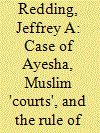

|
|
|
|
|
| Publication |
2014.
|
| Summary/Abstract |
This paper aims to challenge the disparagement of non-state Islamic systems of law that has established firm roots in contemporary rule of law ideology and practice around the world, from India to Ontario. In this respect, rule of law ideology has tended to ignore actual mechanics and procedures of law, not only in legal venues outside the state's direct control, but also in the state's courts themselves. With respect to non-state legal venues-and especially non-state Islamic legal venues-such ideology understands and describes the practices and procedures that it finds in these non-state venues as crude and underdeveloped at best, and illiberal and in violation of the rule of law at worst. While other scholarly work has vividly demonstrated the various transformations and mutations that any state's 'ideal legal procedure' experiences as it is put into real-world practice by a state's courts and judges, this paper makes a converse move. Using a case-study focused on the circumstances and experiences of an Indian Muslim woman, 'Ayesha', who recently used a Delhi dar ul qaza to exercise her Islamic divorce rights in India, this paper demonstrates how a non-state Islamic legal venue behaves in ways which are highly evocative of rule of law ideology's idealization of state courts and how they (should) operate procedurally. In doing so, this paper provides evidence for Partha Chatterjee's thesis as to how elite and subaltern domains-understood here to be embodied in both state and non-state legal venues, respectively-are products of 'mutually conditioned historicities'. In this case, the focus is on the state's conditioning of the non-state. As a result, rule of law ideology's state-oriented critique of the (Islamic) non-state is mistaken because, as this paper demonstrates, the non-state is produced in conversation with the state; one cannot critique the one (non-state) domain without realizing how that critique implicates the other (state) domain.
|
|
|
|
|
|
|
|
|
|
|
|
|
|
|
|
| 3 |
ID:
132968
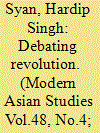

|
|
|
|
|
| Publication |
2014.
|
| Summary/Abstract |
This paper examines the public debate that happened among Delhi's Sikh community following the formation of the Khalsa by Guru Gobind Singh. The detail of this debate was expressed in the early eighteenth century Sikh text, Sri Gur Sobha. The Sri Gur Sobha explains how Delhi's Sikhs became divided into pro-Khalsa and anti-Khalsa factions, and how this conflict resulted in a campaign of persecution against Delhi's Khalsa Sikhs. In this paper I endeavour to analyse exactly why this dispute occurred and how it reflects wider political and socio-economic processes in early modern India and Sikh society. In addition, the paper will explore how the elite Khatri community consequently became an object of hatred in eighteenth century Khalsa Sikh literature.
|
|
|
|
|
|
|
|
|
|
|
|
|
|
|
|
| 4 |
ID:
132963
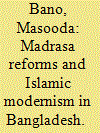

|
|
|
|
|
| Publication |
2014.
|
| Summary/Abstract |
The old project of modernizing madrasas has acquired a new zeal in South Asia after September 2011, whereby madrasa reform programmes became an acknowledged soft tactic of the war on terror. With 9000 Aliya (reformed) madrasas, the Bangladesh madrasa modernization programme has been identified as a potentially useful model for the neighbouring states of Pakistan and India who have made slower progress in implementing similar programmes. In this paper I argue that, although the Aliya madrasa system in Bangladesh has succeeded in integrating secular subjects in the madrasa curriculum, in reality this modernization project has failed in its underlying ambition to generate a 'modern discourse' on Islam-a discourse that is compatible with the demands of western modernity. The right to speak for Islam is still primarily exercised by the 'ulama and graduates of the Qoumi (unreformed) madrasas. Aliya madrasas today compete with the secular schools not with Qoumi madrasas. The growth of the Aliya madrasa system in Bangladesh, instead of bearing testimony to the popular appeal of the modernization agenda, demonstrates the preference of Muslim parents for increased Islamic content in the school curriculum
|
|
|
|
|
|
|
|
|
|
|
|
|
|
|
|
| 5 |
ID:
132960
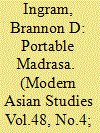

|
|
|
|
|
| Publication |
2014.
|
| Summary/Abstract |
In the first decades of the twentieth century, classically trained Muslim scholars (`ulama) of the influential Deobandi school of North India issued a number of immensely popular, mass-printed 'primers' on Islamic belief and ritual practice. Now ubiquitous in the Islamic bookshops in South Asia and elsewhere, these primers sought to summarize the rudiments of an Islamic education for a nascent lay Muslim reading public. Focusing on three Deobandi `ulama-Ashraf `Ali Thanvi (d. 1943), Mufti Muhammad Kifayatullah (d. 1952), and Muhammad Manzur Nu`mani (d. 1997)-this paper explores how their primers advanced the Deobandi school's well-known critique of popular piety even as they claimed to address Muslims generally, and how their authors negotiated the subtle dynamics of print. Understanding the potentially subversive power of print to open a space for readers to form their own interpretations of minute doctrinal matters and the threat of mass-printed religious texts to their own authority, these `ulama implored readers to refrain from forming their own opinions of the primers' content and to consult the `ulama throughout the reading process. Thus, even as they took advantage of print's possibilities, they remained deeply suspect of its ramifications.
|
|
|
|
|
|
|
|
|
|
|
|
|
|
|
|
| 6 |
ID:
132969
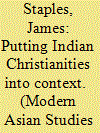

|
|
|
|
|
| Publication |
2014.
|
| Summary/Abstract |
Gandhian and Hindutva-inspired discourses around conversions to Christianity in India over-simplify the historical nexus of relations between missionaries, converts and the colonial state. Challenging the view that conversions were ever only about material gain, this paper draws on long-term ethnographic fieldwork with leprosy-affected people in South India to consider the role that conversion has also played in establishing alternative, often positively construed, identities for those who came to live in leprosy colonies from the mid twentieth century onwards. The paper draws out the distinctive values associated with a Christian identity in India, exploring local Christianities as sets of practices through which, for example, a positive sense of belonging might be established for those otherwise excluded, rather than being centred upon personal faith and theology per se. Biographical accounts are drawn upon to document and analyse some of the on-the-ground realities, and the different implications-depending on one's wider social positioning-of converting from Hinduism to Christianity in South India.
|
|
|
|
|
|
|
|
|
|
|
|
|
|
|
|
| 7 |
ID:
132967
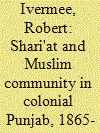

|
|
|
|
|
| Publication |
2014.
|
| Summary/Abstract |
This paper argues that concerns for the government appointment of qazis, officers for the administration of Muslim law, and the greater application of shari'at critically shaped Muslim community formation in later nineteenth century Punjab. Between 1865 and 1885, Punjabi Muslim elites attested the necessity of qazis being appointed by government and Muslim law being administered in the colonial judicial system. With the support of Gottlieb Leitner, registrar of the Punjab University College, Muslim parties used the emergent associations of Punjab civil society, including the Anjuman-i-Punjab (Lahore) and Anjuman-i-Islam (Lahore), to assert the indispensability of religious law. In doing so, they challenged the Anglo-Indian decision to prioritize customary law in the Punjab and advanced the religious group as the basic social unit of Punjab society. In Punjab public spaces, the relevance of Islam was proclaimed, challenging the professed Anglo-Indian distinction between private and public, religious and secular spheres. However, demands for qazi appointment and the administration of shari'at problematize well-rehearsed arguments about the relationships between family, community, state and religion in colonial Punjab. Only through an enquiry into the two decades after 1865 may later political campaigns for the application of shari'at be understood.
|
|
|
|
|
|
|
|
|
|
|
|
|
|
|
|
| 8 |
ID:
132966
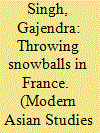

|
|
|
|
|
| Publication |
2014.
|
| Summary/Abstract |
The arrival of Indian sipahis (or 'sepoys') to fight alongside soldiers of the British Expeditionary Force in France in October 1914 was both a victory and a source of concern for the British Raj. It proved to be the zenith of martial race fantasies that had been carefully codified from the 1890s, and birthed fears about the effects that Europe and the rapidly intensifying conflict on the Western Front would have upon the 'best black troops in the world'. The situation resulted in the appointment of a special military censor to examine the letters sent to and from Indian sipahis and compile a fortnightly summary of Indian letters from France for the duration of the First World War. This paper investigates a portion of the letters contained in these reports. More particularly, it investigates the life of a single chain letter and the effect its chiliastic message had upon Muslim troops of the Indian Army during the First World War. As the letter was read, rewritten, and passed on, it served as a rejoinder to missionary efforts by the Ahmadiyya Movement, reinterpreted as a call for soldiers to purify their own bodies and oppose interracial sexual relationships, before, finally, being used as a critique of the British war effort against the Ottoman empire.
|
|
|
|
|
|
|
|
|
|
|
|
|
|
|
|
| 9 |
ID:
132965
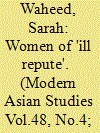

|
|
|
|
|
| Publication |
2014.
|
| Summary/Abstract |
The courtesan, the embodiment of both threat and allure, was a central figure in the moral discourses of the Muslim 'respectable' classes of colonial North India. Since women are seen as the bearers of culture, tradition, the honour of the family, community, and nation, control over women's sexuality becomes a central feature in the process of forming identity and community. As a public woman, the courtesan became the target of severe moral regulation from the mid-nineteenth century onwards. The way in which the courtesan was invoked within aesthetic, ethical, and legal domains shifted over time, and by the third decade of the twentieth century, there appeared a new way of speaking and writing about the 'fallen woman' within the Urdu public sphere. A social critique emerged which heralded the prostitute-courtesan as an ethical figure struggling against an unjust social order. Since the courtesan symbolized both elite Mughal court culture as well as its decay, she was a convenient foil for some nationalists to challenge the dominant idioms of nationalist and communitarian politics. Moreover, certain late medieval and early modern Indo-Persian ethical concepts were redeployed by twentieth century writers for 'progressive' ends. This illustrated a turn to progressive cultural politics that was simultaneously anti-colonial and anti-communitarian, while maintaining a critical posture towards the dominant idioms of Indian nationalism.
|
|
|
|
|
|
|
|
|
|
|
|
|
|
|
|
|
|
|
|
|